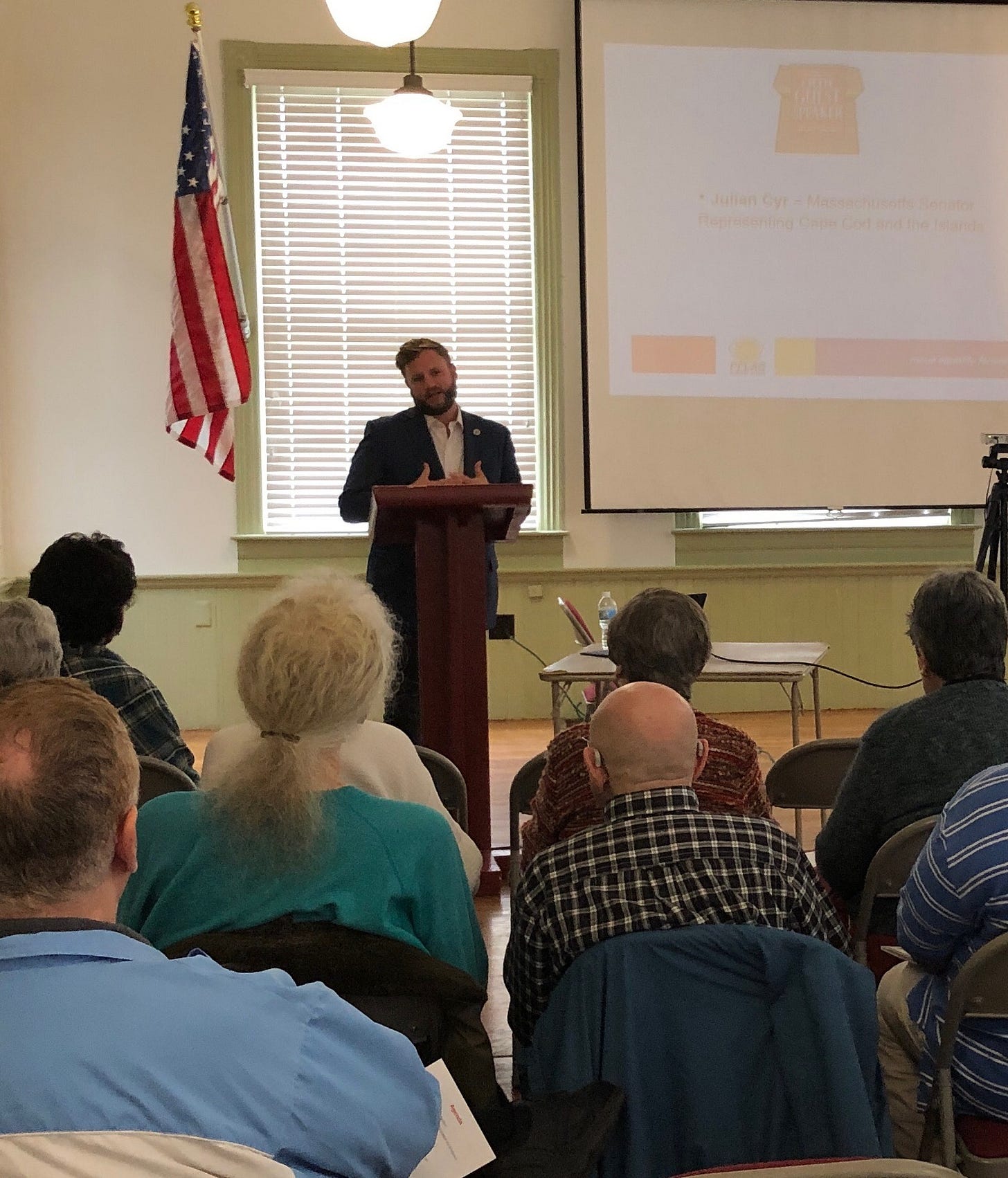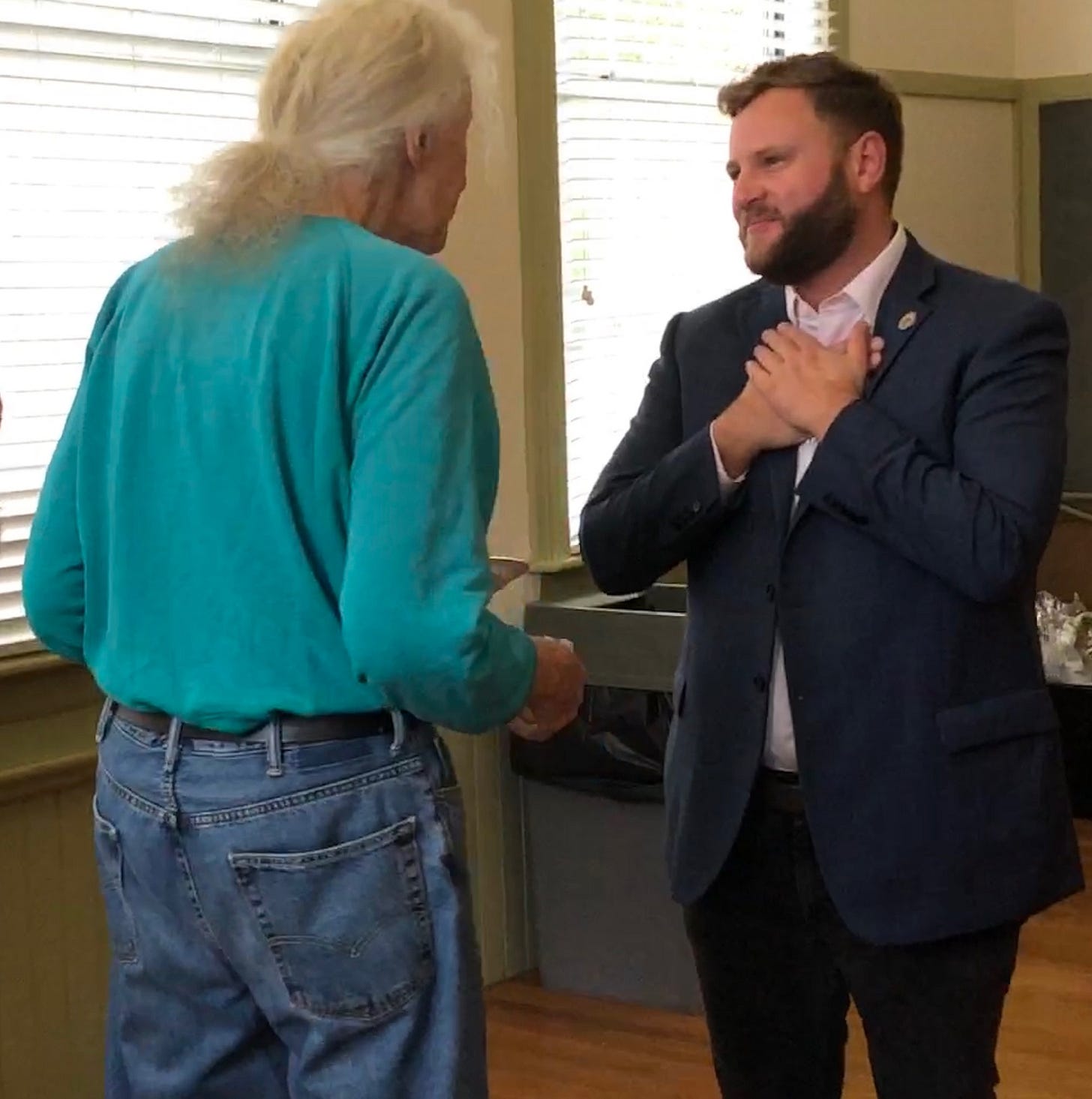Queer and Roving on the Campaign Trail: Getting Out the Vote
In part four, you better knock, knock, knock...on doors.
Reclaiming My Time is a series in which I try to revive some of the writings I lost to the ephemeral nature of the internet. I originally wrote Queer and Roving on the Campaign Trail in November 2018 for the now-defunct NewNowNext.com, a subsidiary of Logo TV, which was owned by Viacom, which shut the whole shit down and wiped everything from the web. Thank god for Word doc drafts. This five-part series followed Sen. Julian Cyr as he ran for re-election and seven years later, paints a picture of the political landscape we would soon inhabit and the resilience of local government amid national upheaval.
“You don’t want to hear about the masturbating man, do you?”
While the answer to that question, depending on who you are, is usually yes, Sandy Milano is referring to one of the more memorable encounters she’s had while canvassing with Julian Cyr. Milano is the president of the Cape and Islands Democratic Council, a volunteer-based political action committee dedicated to helping Democrats get elected at every level of government. She’s been a part of Cyr’s inner circle since his first campaign in 2016 and today she is driving Cyr around houses in the mid-Cape town of Yarmouth to inspire voter turnout.
“Julian and I were knocking doors one day,” Milano continues, “and the guy—when we got to his door he didn’t answer right away—and when he came out he was literally pulling his pants up. He was definitely...doing his thing before we got there.”
That doesn’t sound too bad—at least he had the courtesy to finish before opening the door or this could’ve easily turned into a Weinstein situation—but Milano has an even more disturbing canvassing horror story.
“There was a woman who was an identified Julian Cyr supporter. I knock on her door for GOTV,” Milano begins, referring to their Get Out the Vote initiative, “and she’s clearly going to vote for Donald Trump. Which is just frightening to me. I think she didn’t know that Julian was gay, but she really liked him and she liked everything that he stood for.”
Just then a rafter of wild turkeys (yes, that’s what you call a group of them) surrounds Milano in her car and start following Cyr as he knocks from door to door.
Milano takes it as a good omen since the same thing happened the first and last day she and Cyr canvassed together. But back to the Trump-loving Cyr supporter:
“She must have gone on for about 15 minutes with me about how transgender issues were just crazy and wrong. How can those people even be real people? It was so unbelievably offensive. I couldn’t figure out why she would be voting for a very openly gay guy who was doing everything he could in that realm. And also going to vote for Donald Trump. I will never understand that voter.”
Those kinds of stories are par for the course when canvassing, but as awkward as things may get, knocking doors and asking for people’s votes is one of the most effective ways to turn people out at the polls. And, according to Milano, visiting people in their homes helps you see “the challenges in the community that aren’t being discussed in the media,” citing an older woman who was so incredibly alone and isolated that she invited Milano and Cyr into her home and kept them there for a good 45 minutes.
“I’ll never forget that woman,” Milano says. “We went back to see her for GOTV and she remembered us and invited us back in again but we respectfully declined.”
A New York native, Milano has lived on the Cape for the past 35 years. She started out in the restaurant industry but for about the last 15 years she has been a distressed property advocate, helping people who are losing their homes to foreclosure. Milano got involved in politics in 2014 after meeting then-Attorney General Martha Coakley, whom she realized had worked to benefit not only the clients she advocated for but also Milano, herself, considering Coakley’s efforts to overturn DOMA. Milano ended up basically running the Cape Cod leg of Coakley’s failed campaign for governor. It was a grueling experience, after which Milano promised to never work on another campaign again.
But much like Leslie Sandberg, another badass queer woman who had sworn off politics, she found herself, inspired by his youth and energy, working to get Julian Cyr elected to the Massachusetts state senate.
“I’ll never forget just shooting him a text, like, ‘Hey, if you ever need a hand let me know.’ And here we are two years later. It’s crazy,” Milano says. “I never expected to be doing what I’m doing. But I love the work. It’s so important.”
Canvassing, phone banking, and direct mail are the three primary ways the Cyr campaign reaches out to its voter base, which tends to skew older. So the influence of Facebook, which has been widely criticized for its laissez-faire attitude towards policing misleading information, is minimal.
“Digital is definitely a new frontier in a way to reach voters,” says Madeline McGill, project manager at the Boston progressive consulting firm Field First, which works with the Cyr campaign, “but there’s still no way to verify if the people you’re reaching are actually voters or if they’re registered or not, or if they have any intention of voting. So in terms of reaching people where they’re at, we’ll definitely try to hit them by texting, by digital—but after doors and phones, mail is regarded as a more effective way to reach voters.”
Knocking on doors or making phone calls can be intimidating, whether you’ve never done it before or if, like Sandy Milano, you’ve done it thousands of times. Milano’s advice is to “know why you’re doing it.”
“Most people volunteer to do this kind of work because something has moved them. Someone has really helped them out or their government has really let them down and they’re looking for change,” Milano says. “Talking to voters is really about identifying if they’ve made a decision and if they haven’t, persuading them to vote for your candidate. I think the best way you can possibly do that is A. make sure they know you’re a volunteer and B. tell them why exactly you’re giving up your Saturday or Sunday afternoon to walk around their neighborhood and talk to them. And tie it to a personal thing.
“When we talk too much about party politics or Donald Trump, everybody shuts down because we’re just all sick of it. Ishut down when people talk to me about that stuff. And it’s hard, man. The first door I knock on every turf is always really hard. It’s kind of scary to talk to someone that you don’t know. You have no idea what they’re going to say or what their positions are. And you’re talking to them about politics, which is the most divisive thing in the country right now. But the truth is, people really appreciate that you’re participating in democracy, even if they don’t agree with you, and they appreciate the work that the [candidate] is doing. You really get a much clearer perspective as to what matters to voters and I don’t think the media has it right most of the time.”
In two hours, Cyr hits about 45 doors. All part of a day’s work that also includes a stop at the West Barnstable chapter of PFLAG, a nationwide organization uniting families, friends, and allies with the LGBTQ community. Cyr is the keynote speaker at the PFLAG Cape Cod Annual Meeting. Among the topics he discusses is a statewide gay conversion therapy ban bill that failed to pass in the legislature based on technicality. Though Massachusetts is known for its strong liberal leanings, Cyr acknowledges there are a number of progressive provisions the state has yet to, or has been late to, pass. A ban on conversion therapy is among them.
“The senate has passed this several times in several sessions,” Cyr says, adding that the speaker of the house was reticent to bring an issue, like conversion therapy, that members of the Democratic caucus “would have a hard time voting on.” Cyr also cites a perception that certain “interest groups” or certain communities only get one “chit” per legislative session, which is every two years. “Once we passed public accommodations for transgender people [in 2016], the legislature had ‘done something for the LGBTQ community’ that year and that was it.”
It should be noted that there is a ballot measure this year to repeal that law protecting trans people in public spaces.
Cyr says he’s “actively trying” to change that perception by considering the needs of LGBTQ people in other issues such as criminal justice reform or youth sexual education. To wit, he’s trying to pass a bill that would treat access to PrEP (pre-exposure prophylaxis) for minors similarly to access to birth control, so that there’s a protocol and process for minors who otherwise don’t have access to it.
Both the house and the senate actually managed to pass the conversion therapy ban this session, but it ended up being a casualty of bureaucracy. The legislative ends on July 31 of an election year and both chambers of the Massachusetts legislature passed the bill at 11:30 pm, before the midnight deadline, but the bill’s actual physical papers didn’t get to the engrossing division—the last step before a bill is sent to the governor to be signed—in time.
“It was a real disappointment,” Cyr says. “We don’t think there’s a lot of conversion therapy happening in Massachusetts currently, but we want to make sure those protections are in place, especially for children who are sent out of state.” Cyr notes he is not aware of any camps in Massachusetts but that they exist in nearby New Hampshire and other states. “[A ban on conversion therapy] is one of these overdue policies that we should have here in Massachusetts,” Cyr says, adding he hopes to get the ban passed before the Thanksgiving break in 2019.
Another bill, “Gender X,” also stands a pretty good chance of getting passed next year. The bill, which would allow people to select a third gender option on their driver’s licenses and other state documents, has become a priority of the senate president, Karen Spilka. Spilka, a Democrat representing the Second Middlesex and Norfolk districts, was inspired to take up the Gender X bill after receiving a letter from a young nonbinary constituent named Ella, who described how stressful it was simply applying for a license.
"I don't want the validity of my license being questioned because of how I appear," Ella said at a press conference in June, with Spilka by their side. "I want it to correspond to how I live my life."







